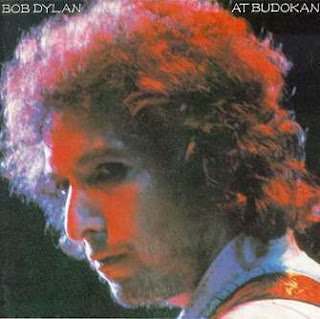Album: Street-Legal
Recorded: April-May 1978
Released: June 1978
Songs / length: 9 / 50:18
I picked this album up on vinyl in the late 90s and, in all honesty, wasn't very taken with it. Original criticisms of the record's muddy production are valid, and it's only really since the album was remastered about 20 years after its initial release that it was given a deserved reappraisal. All that said, Street-Legal still feels to me like a big falling-off compared to Dylan's two majestic mid-70s albums, Blood On The Tracks and Desire.
 Divorce proceedings with his wife Sara explain the long gap between recording his previous album Desire and this one. Maybe it's me reading too much into things after the fact, but Dylan does sound wearier to me on Street-Legal than on his previous record. There's a picture of him on the back of my vinyl edition, all dressed in white with black eyeliner, which almost sums up my impression of him at this time – older, slightly washed up and in need of a new direction.
Divorce proceedings with his wife Sara explain the long gap between recording his previous album Desire and this one. Maybe it's me reading too much into things after the fact, but Dylan does sound wearier to me on Street-Legal than on his previous record. There's a picture of him on the back of my vinyl edition, all dressed in white with black eyeliner, which almost sums up my impression of him at this time – older, slightly washed up and in need of a new direction.Opening track Changing Of The Guards places Street-Legal very much in a musical moment of time, i.e. the late 70s style of Bruce Springsteen, who characterises that "E Street" (rock music + saxophone) sound. Dylan was still hugely popular, but there's the sense of a new guard coming through.
Street-Legal's opening song also sees Dylan taking stock of his career so far, the "sixteen years" of the first line likely a reference to the time elapsed since releasing his first, self-titled LP in 1962. There are also hints in the lyrics of Dylan's renewed interest in Christianity, with biblical references such as "Eden", "false idols" and the "good shepherd", as though he is signalling the start of a new chapter. I like the song's sound, but for me there's something incoherent about its message.
Changing Of The Guards and Baby, Stop Crying were the two singles releases and both did surprisingly well in the UK, but less so in the US. I don't particularly like either song, in the latter case because Dylan sounds unremitting miserable. The album's best moments for me are No Time To Think and Where Are You Tonight? (Journey Through Dark Heart), while Señor (Yankee Tales of Power) is also a highlight, and one of the few songs off the record that Dylan has consistently played live since.
 |
| Released in 1979, At Budokan is a recording of a Japanese concert on Dylan's 1978 world tour |
On No Time To Think, you can hear the pain that Dylan feels at being rejected by his ex-wife, and the lyrics are spectacularly bleak ("China doll, alcohol, duality, mortality / Mercury rules you and destiny fools you") and raw ("Stripped of all virtue as you crawl through the dirt / You can give but you cannot receive"). On Señor, Dylan almost sounds like he's addressing God and seeking redemption and the heavenly backing vocals help to emphasise this feeling. It's one of the few songs on the record that I feel wouldn't have been out of place on his previous record, Desire.
After some middling songs – True Love Tends To Forget and We Better Talk This Over – the album closes with a real gem, Where Are You Tonight? Musically, it's quite simple and puts the emphasis on Dylan's lyrics and suddenly energised voice. He almost sounds like he's managed to tunnel his way out of the hell of divorce and purgatory of court proceedings to find a "pathway that leads up to the stars". That said, the closing lines still sound bittersweet.
There’s a new day at dawn and I’ve finally arrived
If I’m there in the morning, baby, you’ll know I’ve survived
I can’t believe it, I can’t believe I’m alive
But without you it just doesn’t seem right
Oh, where are you tonight?
Album rating: B-

Comments